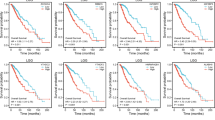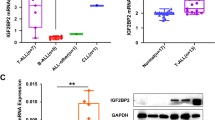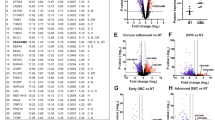Abstract
Background
Gallbladder cancer (GBC) is a highly aggressive malignancy with limited therapeutic options and a poor prognosis. Elucidating the molecular mechanisms driving GBC progression is essential for identifying novel therapeutic targets.
Methods
Single-cell transcriptomics, high-throughput sequencing, and proteomics techniques were employed to investigate the role of the IGF2BP2-PRMT5 axis in GBC. Functional assays were conducted to assess cell proliferation, invasion, and migration, while mechanistic studies examined the impact of N6-methyladenosine (m6A) modifications and downstream signalling pathways. Furthermore, a humanised mouse model was utilised to examine the impact of this axis on immune cell infiltration and tumour immune evasion.
Results
IGF2BP2 was found to stabilise PRMT5 expression via m6A modifications, thereby promoting GBC cell proliferation, invasion, and migration. Mechanistically, PRMT5 activated the AKT/mTOR pathway, upregulated SREBP1, and reprogrammed lipid metabolism, leading to increased lipid synthesis and accumulation. Functional assays and in vivo experiments revealed that modulation of the IGF2BP2-PRMT5 axis significantly influenced immune cell infiltration, fostering immune evasion.
Conclusions
The IGF2BP2-PRMT5 axis is critical in GBC progression by orchestrating metabolic reprogramming and immune modulation. Targeting this axis holds potential as a therapeutic strategy for combating GBC.
This is a preview of subscription content, access via your institution
Access options
Subscribe to this journal
Receive 24 print issues and online access
269,00 € per year
only 11,21 € per issue
Buy this article
- Purchase on SpringerLink
- Instant access to full article PDF
Prices may be subject to local taxes which are calculated during checkout












Similar content being viewed by others
Data availability
All data generated or analysed during this study are included in this article and/or its supplementary material files. Further enquiries can be directed to the corresponding author.
References
Lamarca A, Edeline J, Goyal L. How I treat biliary tract cancer. ESMO Open. 2022;7:100378.
Valle JW, Kelley RK, Nervi B, Oh DY, Zhu AX. Biliary tract cancer. Lancet. 2021;397:428–44.
Sung H, Ferlay J, Siegel RL, Laversanne M, Soerjomataram I, Jemal A, et al. Global cancer statistics 2020: GLOBOCAN estimates of incidence and mortality worldwide for 36 cancers in 185 countries. CA A Cancer J Clin. 2021;71:209–49.
Roa JC, García P, Kapoor VK, Maithel SK, Javle M, Koshiol J. Gallbladder cancer. Nat Rev Dis Primers. 2022. https://doi.org/10.1038/s41572-022-00398-y.
Feo CF, Ginesu GC, Fancellu A, Perra T, Ninniri C, Deiana G, et al. Current management of incidental gallbladder cancer: a review. Int J Surg. 2022;98:106234.
Benson AB, D’Angelica MI, Abrams T, Abbott DE, Ahmed A, Anaya DA, et al. NCCN Guidelines® Insights: Biliary Tract Cancers, Version 2.2023. J Natl Compr Cancer Netw. 2023;21:694–704.
Okumura K, Gogna S, Gachabayov M, Felsenreich DM, McGuirk M, Rojas A, et al. Gallbladder cancer: historical treatment and new management options. WJGO. 2021;13:1317–35. https://doi.org/10.4251/wjgo.v13.i10.1317.
Wang X, Liu C, Chen J, Chen L, Ren X, Hou M, et al. Single-cell dissection of remodeled inflammatory ecosystem in primary and metastatic gallbladder carcinoma. Cell Discov. 2022. https://doi.org/10.1038/s41421-022-00445-8.
Wang J, Chen L, Qiang P. The role of IGF2BP2, an m6A reader gene, in human metabolic diseases and cancers. Cancer Cell Int. 2021. https://doi.org/10.1186/s12935-021-01799-x.
Xu X, Yu Y, Zong K, Lv P, Gu Y. Up-regulation of IGF2BP2 by multiple mechanisms in pancreatic cancer promotes cancer proliferation by activating the PI3K/Akt signaling pathway. J Exp Clin Cancer Res. 2019. https://doi.org/10.1186/s13046-019-1470-y.
Cui J, Tian J, Wang W, He T, Li X, Gu C, et al. IGF2BP2 promotes the progression of colorectal cancer through a YAP‐dependent mechanism. Cancer Sci. 2021;112:4087–99.
Weng H, Huang F, Yu Z, Chen Z, Prince E, Kang Y, et al. The m6A reader IGF2BP2 regulates glutamine metabolism and represents a therapeutic target in acute myeloid leukemia. Cancer Cell. 2022;40:1566–1582.e10.
Kim H, Ronai ZA. PRMT5 function and targeting in cancer. CST. 2020;4:199–215.
Kim H, Kim H, Feng Y, Li Y, Tamiya H, Tocci S, et al. PRMT5 control of cGAS/STING and NLRC5 pathways defines melanoma response to antitumor immunity. Sci Transl Med. 2020. https://doi.org/10.1126/scitranslmed.aaz5683.
Beketova E, Owens JL, Asberry AM, Hu CD. PRMT5: a putative oncogene and therapeutic target in prostate cancer. Cancer Gene Ther. 2021;29:264–76.
Wu Y, Wang Z, Han L, Guo Z, Yan B, Guo L, et al. PRMT5 regulates RNA m6A demethylation for doxorubicin sensitivity in breast cancer. Mol Ther. 2022;30:2603–17.
Huang L, Zhang X-O, Rozen EJ, Sun X, Sallis B, Verdejo-Torres O, et al. PRMT5 activates AKT via methylation to promote tumor metastasis. Nat Commun. 2022. https://doi.org/10.1038/s41467-022-31645-1.
Bian X, Liu R, Meng Y, Xing D, Xu D, Lu Z. Lipid metabolism and cancer. J Exp Med. 2020. https://doi.org/10.1084/jem.20201606.
Cao Y. Adipocyte and lipid metabolism in cancer drug resistance. J Clin Investig. 2019;129:3006–17.
Wang Z, Wang Y, Li Z, Xue W, Hu S, Kong X. Lipid metabolism as a target for cancer drug resistance: progress and prospects. Front Pharmacol. 2023. https://doi.org/10.3389/fphar.2023.1274335.
Zhang Y, Yang Z, Liu Y, Pei J, Li R, Yang Y. Targeting lipid metabolism: novel insights and therapeutic advances in pancreatic cancer treatment. Lipids Health Dis. 2025. https://doi.org/10.1186/s12944-024-02426-0.
Yang T, Luo Y, Liu J, Liu F, Ma Z, Liu G, et al. A novel signature incorporating lipid metabolism- and immune-related genes to predict the prognosis and immune landscape in hepatocellular carcinoma. Front Oncol. 2023. https://doi.org/10.3389/fonc.2023.1182434.
Zhang J, Yang K, Bu J, Yan J, Hu X, Liu K, et al. IGF2BP3 promotes progression of gallbladder carcinoma by stabilizing KLK5 mRNA in N6-methyladenosine-dependent binding. Front Oncol. 2022. https://doi.org/10.3389/fonc.2022.1035871.
Keefe F, Monzón-Sandoval J, Rosser AE, Webber C, Li M. Single-cell transcriptomics reveals conserved regulatory networks in human and mouse interneuron development. IJMS. 2023;24:8122.
Zheng H, Liu H, Ge Y, Wang X. Integrated single-cell and bulk RNA sequencing analysis identifies a cancer associated fibroblast-related signature for predicting prognosis and therapeutic responses in colorectal cancer. Cancer Cell Int. 2021. https://doi.org/10.1186/s12935-021-02252-9.
Yan T, Qiu W, Weng H, Fan Y, Zhou G, Yang Z. Single-cell transcriptomic analysis of ecosystems in papillary thyroid carcinoma progression. Front Endocrinol. 2021. https://doi.org/10.3389/fendo.2021.729565.
Zhang M, Yang H, Wan L, Wang Z, Wang H, Ge C, et al. Single-cell transcriptomic architecture and intercellular crosstalk of human intrahepatic cholangiocarcinoma. J Hepatol. 2020;73:1118–30.
Ritchie ME, Phipson B, Wu D, Hu Y, Law CW, Shi W, et al. limma powers differential expression analyses for RNA-sequencing and microarray studies. Nucleic Acids Res. 2015;43:e47.
Arunachalam D, Ramanathan SM, Menon A, Madhav L, Ramaswamy G, Namperumalsamy VP, et al. Expression of immune response genes in human corneal epithelial cells interacting with Aspergillus flavus conidia. BMC Genom. 2022. https://doi.org/10.1186/s12864-021-08218-5.
Linkner TR, Ambrus V, Kunkli B, Szojka ZI, Kalló G, Csősz É, et al. Cellular proteo-transcriptomic changes in the immediate early-phase of lentiviral transduction. Microorganisms. 2021;9:2207.
Deng YJ, Ren EH, Yuan WH, Zhang GZ, Wu ZL, Xie QQ. GRB10 and E2F3 as diagnostic markers of osteoarthritis and their correlation with immune infiltration. Diagnostics. 2020;10:171.
Peng X, Wang Y, Hu H, Zhang X, Li Q. Identification of the molecular subgroups in coronary artery disease by gene expression profiles. J Cell Physiol. 2019;234:16540–8.
Gao X, Guo Z, Wang P, Liu Z, Wang Z. Transcriptomic analysis reveals the potential crosstalk genes and immune relationship between IgA nephropathy and periodontitis. Front Immunol. 2023. https://doi.org/10.3389/fimmu.2023.1062590.
Tremblay BL, Guénard F, Lamarche B, Pérusse L, Vohl MC. Network analysis of the potential role of DNA methylation in the relationship between plasma carotenoids and lipid profile. Nutrients. 2019;11:1265.
Dai F, Wu J, Deng Z, Li H, Tan W, Yuan M, et al. Integrated bioinformatic analysis of DNA methylation and immune infiltration in endometrial cancer. BioMed Res Int. 2022. https://doi.org/10.1155/2022/5119411.
Wang C, Zhang X, Chen R, Zhu X, Lian N. EGR1 mediates METTL3/m6A/CHI3L1 to promote osteoclastogenesis in osteoporosis. Genomics. 2023;115:110696.
Wang Y, Xiao G, He S, Liu X, Zhu L, Yang X, et al. Protection against acute cerebral ischemia/reperfusion injury by QiShenYiQi via neuroinflammatory network mobilization. Biomed Pharmacother. 2020;125:109945.
Shin H, Choi H, So D, Kim Y, Cho K, Chung H, et al. ITF2 prevents activation of the β-catenin–TCF4 complex in colon cancer cells and levels decrease with tumor progression. Gastroenterology. 2014;147:430–442.e8.
Wei C-Y, Zhu M-X, Lu N-H, Liu J-Q, Yang Y-W, Zhang Y, et al. Circular RNA circ_0020710 drives tumor progression and immune evasion by regulating the miR-370-3p/CXCL12 axis in melanoma. Mol Cancer. 2020. https://doi.org/10.1186/s12943-020-01191-9.
Liu B, Lin J, Bai L, Zhou Y, Lu R, Zhang P, et al. Paeoniflorin inhibits mesangial cell proliferation and inflammatory response in rats with mesangial proliferative glomerulonephritis through PI3K/AKT/GSK-3β pathway. Front Pharmacol. 2019. https://doi.org/10.3389/fphar.2019.00978.
Li S, Mai H, Zhu Y, Li G, Sun J, Li G, et al. MicroRNA-4500 inhibits migration, invasion, and angiogenesis of breast cancer cells via RRM2-dependent MAPK signaling pathway. Mol Ther Nucleic Acids. 2020;21:278–89.
Zhai J, Chen H, Wong CC, Peng Y, Gou H, Zhang J, et al. ALKBH5 drives immune suppression via targeting AXIN2 to promote colorectal cancer and is a target for boosting immunotherapy. Gastroenterology. 2023;165:445–62.
Zhai L, Tai W-L, Pan Y-Q, Luo J-B, Ma L, Zheng Y-T, et al. Expression of EZH2 and P53 and their correlation in ovarian cancer tissues. Int J Clin Exp Pathol. 2020;13:456–64.
Wang Z, Liu F, Ye S, Jiang P, Yu X, Xu J, et al. Plasma proteome profiling of high-altitude polycythemia using TMT-based quantitative proteomics approach. J Proteom. 2019;194:60–69.
Guo H, Guo H, Zhang L, Fan Y, Fan Y, Tang Z, et al. Dynamic TMT-based quantitative proteomics analysis of critical initiation process of totipotency during cotton somatic embryogenesis transdifferentiation. IJMS. 2019;20:1691.
Cheng Y, Gao Z, Zhang T, Wang Y, Xie X, Han G, et al. Decoding m6A RNA methylome identifies PRMT6-regulated lipid transport promoting AML stem cell maintenance. Cell Stem Cell. 2023;30:69–85.e7.
Yang Z, Wang T, Wu D, Min Z, Tan J, Yu B. RNA N6-methyladenosine reader IGF2BP3 regulates cell cycle and angiogenesis in colon cancer. J Exp Clin Cancer Res. 2020. https://doi.org/10.1186/s13046-020-01714-8.
Zhao S, Cheng L, Shi Y, Li J, Yun Q, Yang H. MIEF2 reprograms lipid metabolism to drive progression of ovarian cancer through ROS/AKT/mTOR signaling pathway. Cell Death Dis. 2021. https://doi.org/10.1038/s41419-020-03336-6.
Zhang Y, Xu J, Qiu Z, Guan Y, Zhang X, Zhang X, et al. STK25 enhances hepatocellular carcinoma progression through the STRN/AMPK/ACC1 pathway. Cancer Cell Int. 2022. https://doi.org/10.1186/s12935-021-02421-w.
Zhang Q-F, Li J, Jiang K, Wang R, Ge J, Yang H, et al. CDK4/6 inhibition promotes immune infiltration in ovarian cancer and synergizes with PD-1 blockade in a B cell-dependent manner. Theranostics. 2020;10:10619–33.
Liu L, Yan H, Ruan M, Yang H, Wang L, Lei B, et al. An AKT/PRMT5/SREBP1 axis in lung adenocarcinoma regulates de novo lipogenesis and tumor growth. Cancer Sci. 2021;112:3083–98.
Yuan H, Zhao M, Zhao L, Yun H, Yang G, Geng Y, et al. PRMT5 confers lipid metabolism reprogramming, tumour growth and metastasis depending on the SIRT7-mediated desuccinylation of PRMT5 K387 in tumours. Acta Pharm Sin. 2022;43:2373–85.
Luo D, Xiao H, Dong J, Li Y, Feng G, Cui M, et al. B7-H3 regulates lipid metabolism of lung cancer through SREBP1-mediated expression of FASN. Biochem Biophys Res Commun. 2017;482:1246–51.
Yi J, Zhu J, Wu J, Thompson CB, Jiang X. Oncogenic activation of PI3K-AKT-mTOR signaling suppresses ferroptosis via SREBP-mediated lipogenesis. Proc Natl Acad Sci USA. 2020;117:31189–97.
Shen H, He M, Lin R, Zhan M, Xu S, Huang X, et al. PLEK2 promotes gallbladder cancer invasion and metastasis through EGFR/CCL2 pathway. J Exp Clin Cancer Res. 2019. https://doi.org/10.1186/s13046-019-1250-8.
Hu Y, Jin Y, Wu X, Yang Y, Li Y, Li H, et al. LncRNA-HGBC stabilized by HuR promotes gallbladder cancer progression by regulating miR-502-3p/SET/AKT axis. Mol Cancer. 2019. https://doi.org/10.1186/s12943-019-1097-9.
Baichan P, Naicker P, Devar JWS, Smith M, Candy GP, Nweke E. Targeting gallbladder cancer: a pathway based perspective. Mol Biol Rep. 2020;47:2361–9.
Li Y, Song Y, Zhang Y, Liu S. Progress in gallbladder cancer with lymph node metastasis. Front Oncol. 2022. https://doi.org/10.3389/fonc.2022.966835.
Chen X, Wang D, Liu J, Qiu J, Zhou J, Ying J, et al. Genomic alterations in biliary tract cancer predict prognosis and immunotherapy outcomes. J Immunother Cancer. 2021;9:e003214.
Yang G, Xu Q, Wan Y, Zhang L, Wang Z, Meng F. miR-193a-3p enhanced the chemosensitivity to trametinib in gallbladder carcinoma by targeting KRAS and downregulating ERK signaling. Cancer Biother Radiopharm. 2023;38:371–9.
Ma Q, Zhang Y, Liang H, Zhang F, Liu F, Chen S, et al. EMP3 as a key downstream target of miR-663a regulation interferes with MAPK/ERK signaling pathway to inhibit gallbladder cancer progression. Cancer Lett. 2023;575:216398.
Ai Y, Liu S, Luo H, Wu S, Wei H, Tang Z, et al. METTL3 intensifies the progress of oral squamous cell carcinoma via modulating the m6A amount of PRMT5 and PD-L1. J Immunol Res. 2021;2021:1–15.
Zhang X, Wu J, Wu C, Chen W, Lin R, Zhou Y, et al. The LINC01138 interacts with PRMT5 to promote SREBP1-mediated lipid desaturation and cell growth in clear cell renal cell carcinoma. Biochem Biophys Res Commun. 2018;507:337–42.
Liu X, He H, Zhang F, Hu X, Bi F, Li K, et al. m6A methylated EphA2 and VEGFA through IGF2BP2/3 regulation promotes vasculogenic mimicry in colorectal cancer via PI3K/AKT and ERK1/2 signaling. Cell Death Dis. 2022. https://doi.org/10.1038/s41419-022-04950-2.
Chen J, Ye M, Bai J, Gong Z, Yan L, Gu D, et al. ALKBH5 enhances lipid metabolism reprogramming by increasing stability of FABP5 to promote pancreatic neuroendocrine neoplasms progression in an m6A-IGF2BP2-dependent manner. J Transl Med. 2023. https://doi.org/10.1186/s12967-023-04578-6.
Wang Y, Zeng X, Wang N, Zhao W, Zhang X, Teng S, et al. Long noncoding RNA DANCR, working as a competitive endogenous RNA, promotes ROCK1-mediated proliferation and metastasis via decoying of miR-335-5p and miR-1972 in osteosarcoma. Mol Cancer. 2018. https://doi.org/10.1186/s12943-018-0837-6.
Cao X, Yang Y, Zhou W, Wang Y, Wang X, Ge X, et al. Aprepitant inhibits the development and metastasis of gallbladder cancer via ROS and MAPK activation. BMC Cancer. 2023. https://doi.org/10.1186/s12885-023-10954-8.
Buchegger K, Silva R, López J, Ili C, Araya JC, Leal P, et al. The ERK/MAPK pathway is overexpressed and activated in gallbladder cancer. Pathol Res Pract. 2017;213:476–82.
Zhang S, Ma Y, Hu X, Zheng Y, Chen X. Targeting PRMT5/Akt signalling axis prevents human lung cancer cell growth. J Cell Mol Med. 2018;23:1333–42.
Funding
This study was supported by the Key Research and Development Project of Sichuan Province (2023YFS0171).
Author information
Authors and Affiliations
Contributions
XY and LS contributed equally to this work and were responsible for study design, data acquisition, and manuscript drafting. JG, YZ, and TR performed bioinformatics analyses, including single-cell transcriptomics and high-throughput sequencing data interpretation. YL and LZ conducted functional assays and mechanistic studies to elucidate the role of the IGF2BP2-PRMT5 axis in gallbladder cancer progression. JM supervised the study, provided critical revisions, and finalised the manuscript. All authors read and approved the final version of the manuscript.
Corresponding author
Ethics declarations
Competing interests
The authors declare no competing interests.
Ethical statement
All methods in this study were performed in accordance with the relevant guidelines and regulations. All animal experiments were approved by the Animal Ethics Committee of West China Hospital, Sichuan University (Approval No. 20240103003). Human sample collection and related procedures were approved by the Ethics Committee of West China Hospital, Sichuan University (Approval No. 2023699), and informed consent was obtained from all participants prior to inclusion in the study.
Additional information
Publisher’s note Springer Nature remains neutral with regard to jurisdictional claims in published maps and institutional affiliations.
Supplementary information
Rights and permissions
Springer Nature or its licensor (e.g. a society or other partner) holds exclusive rights to this article under a publishing agreement with the author(s) or other rightsholder(s); author self-archiving of the accepted manuscript version of this article is solely governed by the terms of such publishing agreement and applicable law.
About this article
Cite this article
Yang, X., Sun, L., Guo, J. et al. Deciphering the role of IGF2BP2 and PRMT5 in gallbladder cancer progression: insights from multi-omics analysis. Br J Cancer (2025). https://doi.org/10.1038/s41416-025-03062-w
Received:
Revised:
Accepted:
Published:
DOI: https://doi.org/10.1038/s41416-025-03062-w



